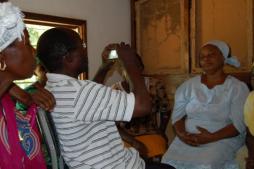- Enable small-scale farmers in rural areas to create an evidence-based multimedia database of their observations about climate change and related phenomena, their effects on their crops and practices, and the strategies and solutions they implement in order to adapt to change. Provide them with the necessary digital communication tools (mobile phones and an Internet-based platform) to do so.
- Encourage the formation of an online and offline network of farmers within the district of Bagamoyo, and facilitate the exchange of knowledge among them through a common web page and periodical face-to-face meetings.
- Establish a communication interface that will improve the flow of information between farmers, extension officers and researchers, focusing on facilitating the two-way flow of information.
- Train farmers in the basic usage of ICT tools, such as web pages and GPRS mobile communications.
- Work in close collaboration with local extension officers and agricultural authorities, who can shape their decisions and policies based on the farmers' field recordings.
- Work together with both local and international agricultural research teams, encouraging them to study and learn from the knowledge gathered by the farmers and integrate it into their practices.
- Link to other entities working with ICT and civil society organizations in Tanzania, Africa and the rest of the world, in order to achieve a cross-regional, multi-cultural knowledge base that can lead to comparative studies and an improved understanding of the day-to-day reality of small-scale farmers in different locations and social settings.

